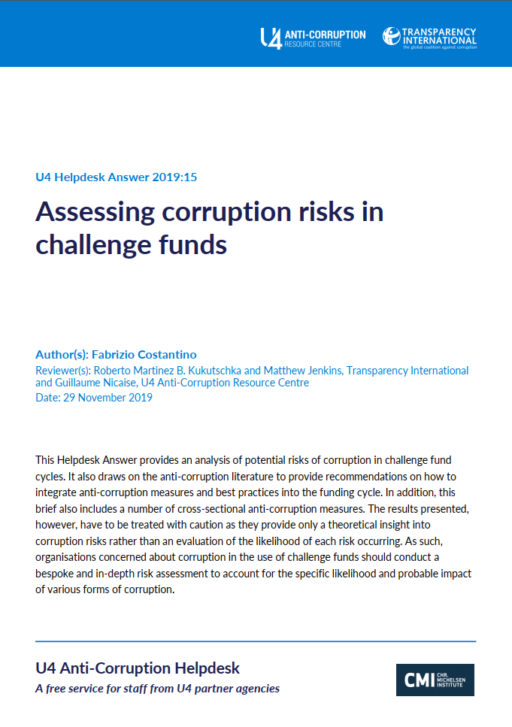
This Anti-Corruption Helpdesk brief was produced in response to a query from a U4 Partner Agency. The U4 Helpdesk is operated by Transparency International in collaboration with the U4 Anti-Corruption Resource Centre based at the Chr. Michelsen Institute.
Query
Provide guidance, best practices and recommendations on how to best integrate anti-corruption measures into challenge fund cycles.
Summary
This Helpdesk Answer provides an analysis of potential risks of corruption in challenge fund cycles. It also draws on the anti-corruption literature to provide recommendations on how to integrate anti-corruption measures and best practices into the funding cycle. In addition, this brief also includes a number of cross-sectional anti-corruption measures. The results presented, however, have to be treated with caution as they provide only a theoretical insight into corruption risks rather than an evaluation of the likelihood of each risk occurring. As such, organisations concerned about corruption in the use of challenge funds should conduct a bespoke and in-depth risk assessment to account for the specific likelihood and probable impact of various forms of corruption
Content
- The importance of anti-corruption risk assessmentsfor development funds
- The risks of corruption in the challengefund cycle
- Cross-sectoral strategies to reduce corruption risk
- Annex: Relative risk of different forms corruption across CF project cycle
- References
Main points
- Challenge Funds may entail high risks of corruption as they operate in specialised fields, have complex project structures with flexible results frameworks and can involve profit-driven actors.
- Given their role as intermediaries between donors and grant holders, fund managers play a critical role in identifying and curbing corrupt practices.
- The severity of different forms of corruption risk vary across the six typical phases of Challenge Fund project cycles.
- The literature presents a range of mitigation measures suited to reducing corruption risk, ranging from clarity in project design to transparency in policies and procedures, third party oversight and grievance mechanisms
Authors
Fabrizio Costantino
Reviewers:
Matthew Jenkins, Roberto Martinez B. Kukutschka, Transparency International
Guillaume Nicaise, U4 Anti-Corruption Resource Centre
Date
20/01/2020
Tags
 Download PDF
Download PDF
